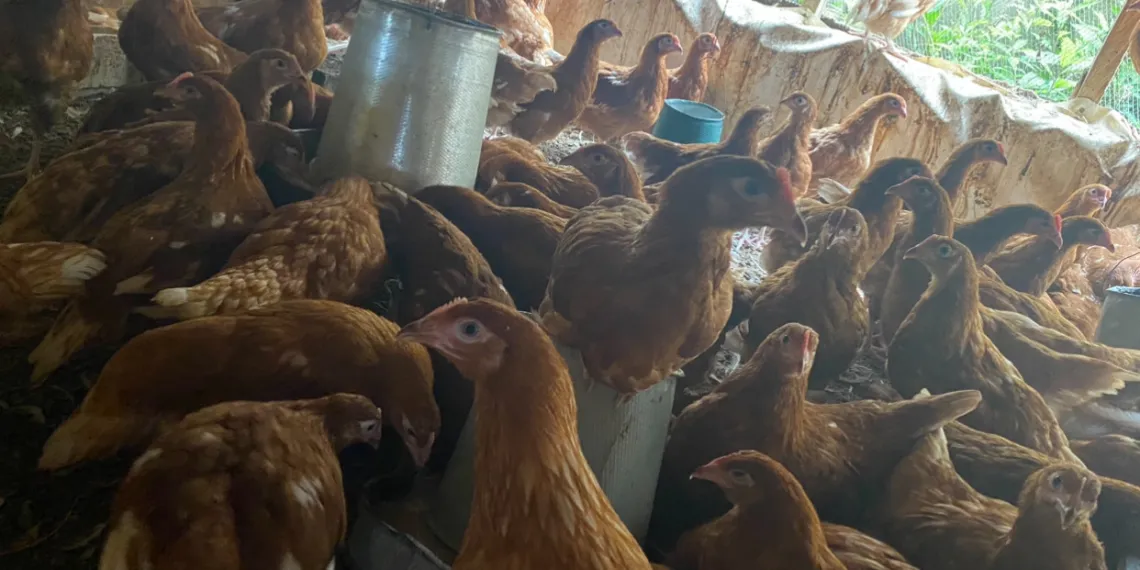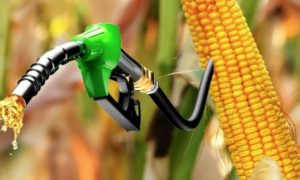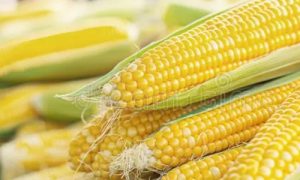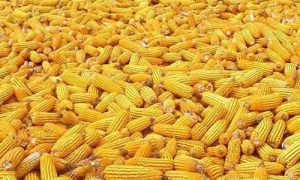Poultry farmers bemoan hardship amidst rising production cost

Nigerian Poultry Crisis: Poultry farmers in Nigeria are facing closures as soaring feed prices and production costs cripple operations. Farmers warn of industry collapse without intervention, citing inflated prices of maize and soybeans, essential for feed. Economic challenges worsened under new policies, including subsidy removal and currency fluctuations, exacerbating food inflation. With farms struggling to sustain operations amid security threats, stakeholders urge government support to stabilize supply and prevent reliance on foreign poultry imports.
Nigerian poultry farmers have complained that several poultry farms are shutting down operations due to skyrocketing prices of poultry feed and unsustainable cost of production, among other challenges in the sector.
The farmers, who spoke with PREMIUM TIMES within the week, said the worrying trend could lead to a total collapse of Nigeria’s poultry industry in no distant time if not addressed by those in authority.
The skyrocketing prices of essential livestock feed ingredients such as maize and soybeans and the growing spate of insecurity across farming communities are negatively affecting poultry output.
The farmers also lamented that general price levels have impacted the purchasing power of most Nigerians, with an attendant effect on the poor sale of poultry products such as eggs and broilers.
Concerns
In recent years, the prices of widely consumed staple food items have skyrocketed amid widespread insecurity and fluctuating weather patterns (climate change), among other concerns.
Meanwhile, the situation became worse in the past year after President Bola Tinubu, upon assuming power in May 2023, announced subsidy removal alongside other policies that triggered a spontaneous economic crisis and other concerns.
An immediate impact of the president’s decision was the sudden jump in the price of petrol by over 100 per cent, with an attendant increase in transportation costs. The aftermath of this became obvious in the increasing prices of goods and services across the country.
Nigerians need credible journalism. Help us report it.
PREMIUM TIMES delivers fact-based journalism for Nigerians, by Nigerians — and our community of supporters, the readers who donate, make our work possible. Help us bring you and millions of others in-depth, meticulously researched news and information.
It’s essential to acknowledge that news production incurs expenses, and we take pride in never placing our stories behind a prohibitive paywall.
Will you support our newsroom with a modest donation to help maintain our commitment to free, accessible news?YES, I’LL DONATE TODAYxDo this later
In less than two months after Mr Tinubu took office last year, he declared a state of emergency on food insecurity, with the hope of addressing the increase in food prices.
Consequently, the prices of major staple food items and livestock feed ingredients such as maize and soybeans rose from what they were before he took over power from his predecessor, Muhammadu Buhari.
Meanwhile, the rising cost of poultry products has made the prices of basic protein such as eggs also unaffordable for many. An egg which was selling for N100 last year is being sold for N200 and above, depending on its size.
The continuous increase in the prices of goods and services over the past year has made some farm owners close shops, poultry farmers said, and that many have already cut down on their production quantity amidst fears that feed producers might have also compromised livestock feed qualities due to skyrocketing prices of feed ingredients.
Meanwhile, a review of the National Bureau of Statistics (NBS) data in the past year indicated that despite moves by the government to boost food production, inflationary pressure subsisted.
Nigeria’s inflation rate has risen since Mr Tinubu became president. According to the National Bureau of Statistics (NBS), inflation rose to 33.95 per cent in May 2024 from 22.41 per cent in May last year. Food inflation followed a similar trend, climbing to 40.66 per cent in May 2024 from 24.82 per cent last year in May.
According to the latest NBS National Agricultural Sample Census (NASC) Report 2022, published last month, there are about 40.2 million agricultural households in Nigeria. Of this figure, the report says only about 42.5 per cent (approximately 17.1 million) of agricultural households raise birds, most commonly chicken.
“While chicken is the most common poultry type raised by more than 95 per cent of poultry-raising households in most of the States, turkey is raised by only 5.4 per cent of those households,” the NBS said.
Poultry farmers lament
Speaking on the recent development, a former president of the Kaduna State chapter of the Poultry Association of Nigeria (PAN), Timothy Okunade, said people are already running away from the poultry industry due to the continuous increase in the prices of poultry feeds and day old chicks ( pullets).
There is no money in circulation. The purchasing power has dropped to an unimaginable level,” Mr Okunade said, adding that poultry products are now luxury as far as Nigerian society is concerned.
Mr Okunade lamented that a bag of maize and soya beans, which are essential ingredients for feed formulation, is selling for N85,000 to N87,000 per bag in his region.
This, he said, is affecting the industry because the higher the prices of these products ( Soybeans and maize), the higher the price of finished products (feedstock).
“As of today, eggs are selling from farms at N4,000/crate. I don’t know how much an egg is being sold at the retailer’s end,” Mr Okunade said, stating that a man who has not eaten since morning, or who is probably receiving N20,000 as salary, cannot afford to buy it conveniently anymore.
In the previous year, Mr Okunade said a bag of maize was sold at the rate of N50,000 to N60,000 but that things took a turn due to the economic crisis.
“This is the first time in the history of Nigeria or the industry ( maize/Soy would be selling for N87,000 and above). The worst period was when we bought a bag of maize for N20,000, not knowing that we had not reached anywhere,” the farmer said.
He explained that when the price of maize rose to N40,000 and above, they were still managing the situation. However, he described the current situation as a “complex one” because farmers are being kidnapped on their farms daily.
“You dare not enter the bush now as a farmer as you’ll regret making such a mistake because kidnappers will kidnap that farmer, and the money he/she has not seen in their life is what the kidnappers are demanding,” Mr Okunade explained, adding that most of the farmers kidnapped don’t survive the trauma.
“I’d rather stay and be hungry than go and die,” he added.
The farmer lamented that the high cost of feed has also made him cut down his production.
On his part, Jolayemi Christopher, who runs a poultry farm in Abuja, explained that the rising cost of poultry feed in the market has also affected his poultry business over the past year.
This, he said, was triggered by the continuous increase in the prices of maize and soybeans in the market.
In his explanations, Mr Christopher said, “For feedmill companies selling layer feeds below N20,000, it is either one or two things; it is either they have kept maize for long that they are now using or they are not milling according to standard.”
The farmer stated it has been observed that some feed mills, instead of using 50 per cent maize, only use 30 per cent maize in their feed.
“That is why farmers cannot get value for their money because the most expensive feed in the market is less than N15,000 in the market. So, how do you want feed millers to make a profit with their production costs at that price? It is simply because they are compromising,” the farmer argued.
He said that most poultry farms are shutting down also because the increase in the prices of maize and Soy is making feed millers compromise some of the components of poultry feed for profit.
Mr Christopher, who is also a veterinary specialist, explained that when some of the components of feed are compromised in terms of concentration, maybe where maize that was supposed to be 50% is now 35%, it will affect the farmers in terms of production.
“When they are supposed to have 90% on their farms, they would be battling with 70-75% in a well-managed system,” he said.
“This is the rainy season. It is the best time for these birds to produce because the weather is cold, but because of the compromise in the feed, production is just about 70% for well-managed farms. Other average farms, of which they are the majority in the country, are just managing 50-50%.”
On his part, Onallo Akpa, director general,
The Poultry Association of Nigeria, described the challenges poultry farmers in the country are facing as ‘very bad’.
“The situation is such that has never been witnessed in the last 13 years of my being in the industry. Poultry farms, especially the medium scale, the small and medium scale farms are shutting down,” he told PREMIUM TIMES in an interview.
Mr Akpa said farms that are still in existence, especially the industrial poultry and integrated poultry farms, are also threatening to shut down because of operational hazards.
“They can’t break through there since there are difficulties in sourcing raw materials, especially maize and soybeans, as well as other raw materials,” he said.
The farmer argued that the situation became worse due to the regulation of petroleum products( subsidy removal), naira floatation, and insecurity.
Mr Akpa emphasised that the insecurity in the country has made it impossible for farmers to go to their farms to produce and that the prices of soybeans and maize in just one year have moved from N30,000 per metric ton to almost N1 million currently, making it difficult for farmers to afford.
“Today we’re threatened and worried that Nigeria may become a dumping ground for all kinds of foreign poultry products,” Mr Akpa said.
Way forward
To remedy the situation, Mr Christopher said there is a need to revamp Nigeria’s storage facilities across the country.
“During the season, we have everything in abundance, but in the off-season, we’re lacking,” he said, adding that most food-producing states like Benue lack effective storage facilities to prevent spoilage of food commodities at peak season.
“During the peak season, the government should provide storage and processing facilities. We have more than enough even with the insecurity; we always have food in abundance during the season, but they are not properly stored,” Mr Christopher said.
He said the naira should be strengthened to curb farmers from selling farm produce to neighbouring countries in the bid to make more profit.
“Immediately, what they ( the government) can do is to at least import grains and give to farmers through the poultry association and all other associations, and give to farmers at a subsidised rate. If not, farmers may not be able to cope,” he said.
In his intervention, Mr Akpa said there is a need for real practical action on the ground across states in the country to address the challenges.
















